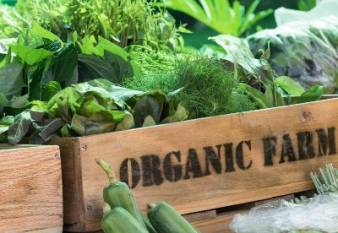NEW DELHI, 11 November 2024: As global awareness about health, environmental sustainability, and food safety increases, organic farming has emerged as a significant movement in agriculture.
In India, organic farming is gaining momentum as consumers become more conscious of the benefits of organic produce. However, the critical question remains: can organic farming meet the growing demand for sustainable produce in India and globally?
The Growth of Organic Farming
Organic farming in India has seen a remarkable rise over the past decade. The country is home to over 2.3 million organic farmers, the highest number in the world, according to the International Federation of Organic Agriculture Movements (IFOAM). The Indian government has supported this growth through various initiatives, including the Paramparagat Krishi Vikas Yojana (PKVY) and the National Program for Organic Production (NPOP).
Organic farming eschews synthetic pesticides and fertilizers, relying instead on natural processes and inputs. It promotes biodiversity, enhances soil fertility, and reduces pollution, making it a cornerstone of sustainable agriculture. Organic farming practices include crop rotation, green manures, composting, and biological pest control.
Benefits of Organic Farming
1. Environmental Sustainability: Organic farming reduces the chemical load on the environment, enhancing soil health, water quality, and biodiversity. By avoiding synthetic inputs, it minimizes the risk of soil degradation and water contamination.
2. Health Benefits: Organic produce is free from synthetic pesticides and fertilizers, making it a healthier option for consumers. It often contains higher levels of vitamins, minerals, and antioxidants compared to conventionally grown produce.
3. Economic Opportunities: Organic farming can offer better market prices and profitability for farmers due to the premium consumers are willing to pay for organic produce. This can lead to increased rural incomes and improved livelihoods.
4. Resilience to Climate Change: Organic farming practices enhance soil structure and fertility, improving resilience to extreme weather conditions and reducing the vulnerability of crops to climate change impacts.
Challenges in Meeting Growing Demand
Despite the benefits and growing consumer demand, organic farming faces several challenges that could hinder its ability to meet the increasing need for sustainable produce:
1. Lower Yields: Organic farming often results in lower yields compared to conventional farming due to the absence of synthetic fertilizers and pesticides. This yield gap can pose a challenge in meeting the food demands of a growing population.
2. High Production Costs: Organic farming requires significant labor and management, increasing production costs. Organic certification and compliance with standards also add to the expenses.
3. Market Access and Infrastructure: Small-scale organic farmers often struggle with market access and infrastructure. Inadequate supply chains, lack of cold storage facilities, and limited access to organic markets can impede their profitability.
4. Certification and Standards: Obtaining organic certification can be complex and expensive, particularly for small farmers. Ensuring compliance with organic standards and maintaining certification can be challenging.
5. Consumer Awareness and Trust: While consumer demand for organic produce is growing, there is still a need to increase awareness and trust. Mislabeling and the presence of spurious organic products in the market can undermine consumer confidence.
Strategies to Enhance the Growth of Organic Farming
To ensure that organic farming can meet the growing demand for sustainable produce, several strategies need to be implemented:
1. Research and Innovation: Investing in research and development to improve organic farming techniques and crop varieties can help bridge the yield gap. Innovations in organic pest control, soil management, and crop rotation can enhance productivity.
2. Government Support and Policies: Continued support from the government in the form of subsidies, incentives, and policy frameworks can encourage the adoption of organic farming. Simplifying the certification process and providing financial assistance for certification can benefit small farmers.
3. Strengthening Supply Chains: Developing robust supply chains, including cold storage facilities and transportation infrastructure, can help organic farmers access markets more efficiently. Establishing organic markets and cooperatives can also improve market access.
4. Consumer Education: Increasing consumer awareness about the benefits of organic produce through campaigns and educational programs can drive demand. Building consumer trust through stringent certification and labeling standards is crucial.
5. Capacity Building and Training: Providing training and capacity-building programs for farmers on organic farming practices can enhance their skills and knowledge. Extension services and support networks can help farmers transition to and succeed in organic farming.
6. Public-Private Partnerships: Collaboration between government agencies, private sector companies, NGOs, and farmer organizations can drive the growth of organic farming. Public-private partnerships can facilitate the development of infrastructure, market linkages, and research initiatives.
Success Stories
India has several success stories in organic farming that highlight its potential:
· Sikkim: Sikkim became the first fully organic state in India in 2016. The state government's strong commitment to organic farming, supported by policies and initiatives, has transformed Sikkim's agricultural landscape.
· Organic Mandya: Organic Mandya, a farmer cooperative in Karnataka, promotes organic farming and connects farmers directly with consumers through its retail stores and online platform. The initiative has improved farmers' incomes and provided consumers with access to quality organic produce.
· 24 Mantra Organic: This company works with over 45,000 farmers across 15 states in India, promoting organic farming practices and providing market access. 24 Mantra Organic's range of organic products has gained popularity both domestically and internationally.
Organic farming holds immense potential to meet the growing demand for sustainable produce. While challenges exist, strategic investments in research, policy support, infrastructure development, and consumer education can drive the growth of organic farming in India.
By promoting environmental sustainability, health benefits, and economic opportunities, organic farming can play a crucial role in ensuring a sustainable and food-secure future for India. The rise of organic farming is not just a trend but a necessary shift towards a more sustainable and resilient agricultural system.























